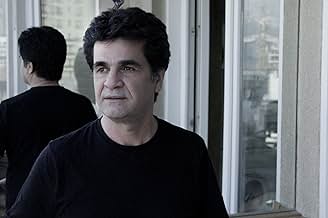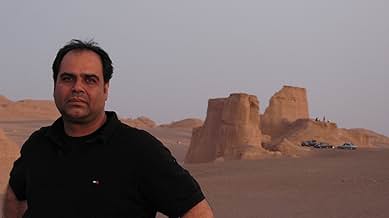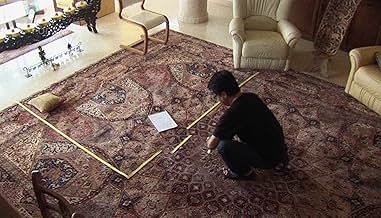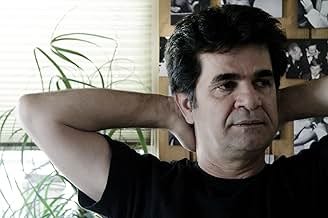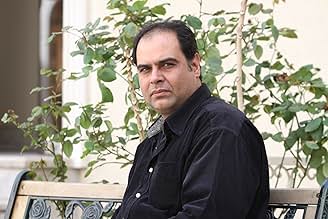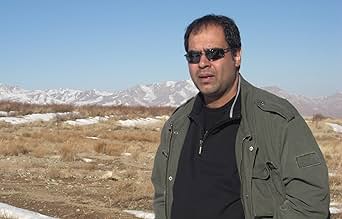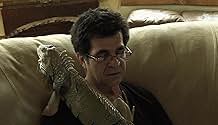अपनी भाषा में प्लॉट जोड़ेंIt's been months since Jafar Panahi, stuck in jail, has been awaiting a verdict by the appeals court. By depicting a day in his life, Panahi and Mojtaba Mirtahmasb try to portray the depriva... सभी पढ़ेंIt's been months since Jafar Panahi, stuck in jail, has been awaiting a verdict by the appeals court. By depicting a day in his life, Panahi and Mojtaba Mirtahmasb try to portray the deprivations looming in contemporary Iranian cinema.It's been months since Jafar Panahi, stuck in jail, has been awaiting a verdict by the appeals court. By depicting a day in his life, Panahi and Mojtaba Mirtahmasb try to portray the deprivations looming in contemporary Iranian cinema.
- पुरस्कार
- 10 जीत और कुल 14 नामांकन
फ़ीचर्ड समीक्षाएं
As part of his sentence, Panahi is barred from making films or writing screenplays, is unable to speak in his behalf, and forbidden to leave the country. While awaiting the results of his appeal, Panahi is filmed in his home by fellow director Mojtaba Mirtahmasb using a digital video camera and a cell phone. What begins as an innocuous home movie with Panahi sitting at his table eating breakfast takes on an added dimension when he calls Mirtahmasb, asking him to come by to discuss some ideas, but cautions him not to tell anyone about his visit.
While waiting for his friend to arrive, he talks on the phone with his lawyer who tells him that the court may waive the 20-year ban on filmmaking but are not likely to reduce his jail sentence. When Mirtahmasb arrives, Panahi reads from his latest screenplay which was rejected by the censors. Acting out the story, he puts tape around the area to suggest the apartment in which the story occurs. As he begins to read the screenplay about a young woman forbidden by her parents to attend university, tears come to his eyes and he stops, saying poignantly,
"If we could tell a film, then why make a film?" and expresses his regret about the harshness of the penalty he faces. Soon he takes care of his pet Iguana, Igi, and cares for a neighbor's dog who doesn't know the value of silence. As fireworks explode on the streets to celebrate the Persian New Year, a college student arrives to collect the trash as a substitute for the custodian, and the two engage in a dialogue, remembering the day when Panahi was arrested. To bring home the point even more forcefully, Panahi watches as a TV newscaster proclaims that fireworks are illegal. What started out as a home movie at the end becomes an act of non-violent protest.
Whether it's a film or not is irrelevant, it's a fantastic comment on the state of Iranian democracy
Whilst under house arrest, and pursuing an appeal against a six year prison sentence and 20 year ban from directing, esteemed Iranian auteur Jafar Panahi (The Mirror, Crimson Gold) invites fellow filmmaker Mojtaba Mirtahmasb into his home to crudely document a day in his tormented life.
Shot on a digicam and later an iPhone, we follow Panahi shuffling around his apartment, feeding his daughter's pet iguana, paying the delivery boy for takeaway food, and calling his tenacious attorney trying to get him out of house arrest. At first, it's a minor study of segregation and loneliness, but This Is Not a Film is at it's most enthralling when Panahi expresses his natural directing flare; acting out his latest screenplay from the (dis)comfort of his family living room, discussing camera angles to the most minute detail, and reflecting on how he managed to reach such a raw level of intimacy in his previous works. Whether you are aware of his filmography or not, it's clear that Panahi is an exuberant cinephile, which makes his current, and ongoing battles with the government even more distressing.
If you were forced to judge this meta-commentary diatribe, one could suggest that Panahi and Mirtahmasb fail to present a bigger picture on the crisis of the state's dominance over artistic intent. Similarly to 2006′s female equality drama Offside, This is Not a Film is incredibly subtle with it's political allegories, bordering on the coyly parabolic. Instead of presenting a bigger, ultimately more controversial picture on the crisis of state dominance in the creative industries, Panahi and Mirtahmasb reach a palpable level of verisimilitude in the very smallness of the situation. It all comes together in a final twenty minute sequence where Panahi falls behind the camera and back into storyteller mode (it could cost him his life, but he can't help it). He follows a young dustman around the apartment block and asking him what his plans for the future will be. The cordial apprentice is unsure, but it's hopefully going to be a life less frightening than the one Panahi has been dealt.
This Is Not A Film concludes with harrowing sentiment. With the sound of New Years' Eve fireworks and cheering in the background, the screen fades to black, with the credits and special thanks nods are left blank, followed by a final frame that sets out a humble dedication to all Iranian filmmakers. It may be a non-film but, whatever it is, it's certainly a riveting watch; and has rightly earned a place in the Oscars' documentary award shortlist.
Here in the Western world, our access to information, democratic governments and human rights mean that cinema is taken for granted, and filmmakers have it easy. Whilst we bemoan the extortionate prices of popcorn, Panahi and Mirtahmasb are putting their lives on the line to tell the stories they feel they must tell, in the hope that, one day, their nation will be able to have the same sort of pro-democratic freedom as the rest of us.
www.366movies.com
We see Panahi, alone in his large high-rise apartment, go about his daily activities, which include eating breakfast, playing with his daughter's iguana named Igi, analyzing his older films in a very deep sense, acting out scenes from his movies, and repeatedly calling his attorney to get a ruling on his case. Because of his "propaganda" films, Panahi has the potential to face six years in prison and the possibility of never directing another film again. This is a scary thought for a man who is clearly not our of words to say.
The naturalism and simplicity is what immediately sold me on this film. It's not hard to tell that much of this picture was comprised on Panahi's spontaneous thoughts. Nothing is very consistent; not all of it is particularly compelling, but all of it is truly a sight to behold. This is Not a Film, in order to receive distribution, was put on a flash drive and smuggled out of Iran in a cake, making this a truly unique picture just in its story. How many films (or "films") can you say you've seen that really shouldn't have been made? While my biggest compliment to the "film" is its naturalism and biographical nature, it also is my most prominent complaint. Many things happen here, some interesting, some not, making this experience fluctuate in quality more-so than any other picture I've seen this year. A strong part of me absolutely lauds Panahi for his bravery and commitment to get his "film" released, yet because of its loose, lax nature, I question why he chose to make it more about his typical day instead of voicing an opinion on the cruelty of the Iranian government. Now, I realize how deviant and asking that sounds, seeing as it was incalculably daring for Panahi to make a film at all. But why not go for broke if you chose to go back on a law at all? Why not question or defend the "propaganda" accusation his films now bear? Why not take in account how you really feel about this whole thing? However, one surprisingly elegant thing he does in This is Not a Film is question what exactly a film is? Moreover, does this picture he's making now count as a film? Is it "illegal" that he's getting his pal Mojtaba Mirtahmasb to film much of it on a cell-phone camera? Is it because it's spontaneous, and follows a very non-linear style that it doesn't qualify as a film? Does a film need to be a certain length to be constituted that? Does anything need to happen? I was reminded of those short films I always find myself watching on Youtube from the late 1800's to the early 1900's of little skits or documentaries that briefly regard life/humor/culture of a country at that specific time. Were they films? They never seemed to follow a strict plot line.
This is Not a Film is something people from all countries (especially America) should watch in order to truly view how repressed, censored, and limited other countries can be. In America, grotesque films like The Human Centipede can be made, showcasing disgust and loathe at its height, 2016: Obama's America can be made, a film that deliberately regards almost everything the current US president says as lies and cites his motives as unworthy, and The Hangover Part II can be made, a raunchy comedic exercise capitalizing off lewdness and politically incorrect humor. The fact that This is Not a Film came to be may sit indifferently with people from America, but the fact that it exists is an astonishing landmark for Iranian freedom of speech. While I can't recommend this work in an overbearing nature, if you go to a video store and find it there, it is probably the one you should pick up for its importance and bold roots. But since it isn't a film, I technically should be reviewing it or saying any of this.
Starring: Jafar Panahi. Directed by: Jafar Panahi and Mojtaba Mirtahmasb.
8/10
It was during the period spent at home in 2010 that Jafar Panahi made this movie, with the title This is Not a Film (In Film Nist). A friend, documentary producer Mojtaba Mirtahmasb (the author of Lady of the Roses, 2008), came with a consumer-grade camera and shot the footage for a 75 minutes video, having Mr. Panahi as co-director, screenwriter, film editor and star. The video was eventually smuggled outside Iran on a flash drive and screened at the 2011 Cannes Festival.
It's just that: 75 minutes in a day spent by Jafar Panahi at home, waiting for the result of the trial. He talks to the phone with his lawyer, then feeds his pet (who is a very nice iguana), then talks with the cameraman shooting the footage about a project for a new film, rejected by the censorship, memories from some of his movies come and go, suddenly a terrible noise of explosions is heard - it's nothing than fireworks, and Mr. Panahi goes to the window to shoot them with his cell phone.
A movie that is not a movie, says Mr. Panahi. It's just mundane reality. Well, it's not that simple: this movie is a non-movie while this non-movie is a movie. Because it's his reality, his universe, which is sending us to the universe of his movies. All his movies talk actually about him, about his universe, and it becomes obvious here, in this non-movie which carries all the tension between image and reality - reality sublimated in cinematic image. Like Mozart, this moviemaker thinks only in artistic constructions. For Mozart any fact of life was musical sound, musical rhythm, for Panahi every fact of life is cinematic image, cinematic rhythm. Look, even his concerns for the sentence to come become art! However, the strongest association should be made to Beethoven! This moviemaker carries all the tension between reality and art, all his creation is fully aware of the paradoxical relationship between reality and art: reality mirrored in art, art mirrored in reality, art suffering that reality struggles to keep its autonomy, reality suffering that it is taken for art.
क्या आपको पता है
- ट्रिवियाDirector Jafar Panahi was put under house arrest in 2010 and banned from filmmaking for 20 years. This film was smuggled out of Iran on a USB stick hidden in a cake.
- भाव
Mojtaba Mirtahmasb: It's important that the cameras are ON.
- कनेक्शनFeatured in Brows Held High: This Is Not a Film, but It's Definitely Filmmaking (2014)
टॉप पसंद
- How long is This Is Not a Film?Alexa द्वारा संचालित
विवरण
- रिलीज़ की तारीख़
- कंट्री ऑफ़ ओरिजिन
- आधिकारिक साइटें
- भाषा
- इस रूप में भी जाना जाता है
- Esto no es una película
- फ़िल्माने की जगहें
- उत्पादन कंपनी
- IMDbPro पर और कंपनी क्रेडिट देखें
बॉक्स ऑफ़िस
- US और कनाडा में सकल
- $77,016
- US और कनाडा में पहले सप्ताह में कुल कमाई
- $12,608
- 4 मार्च 2012
- दुनिया भर में सकल
- $88,758
- चलने की अवधि1 घंटा 15 मिनट
- रंग
इस पेज में योगदान दें



